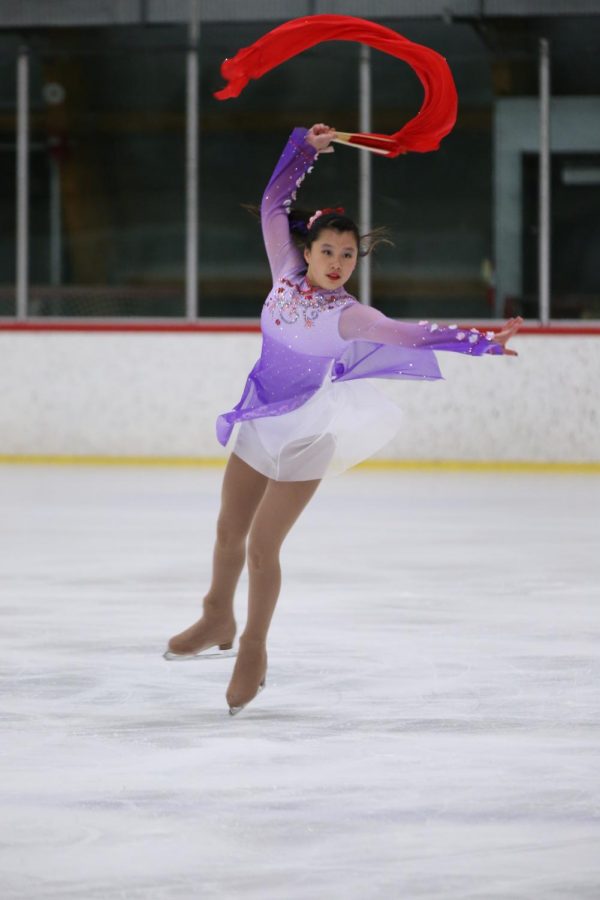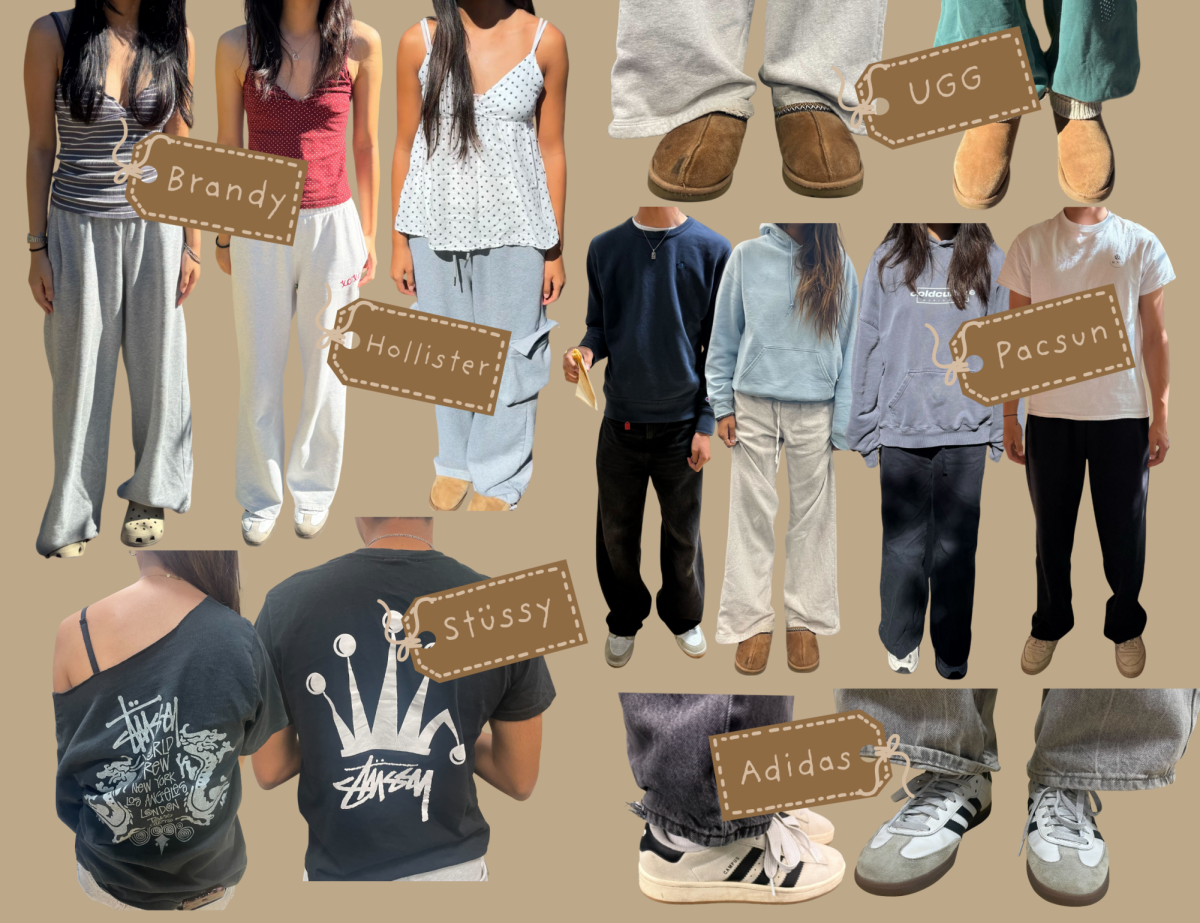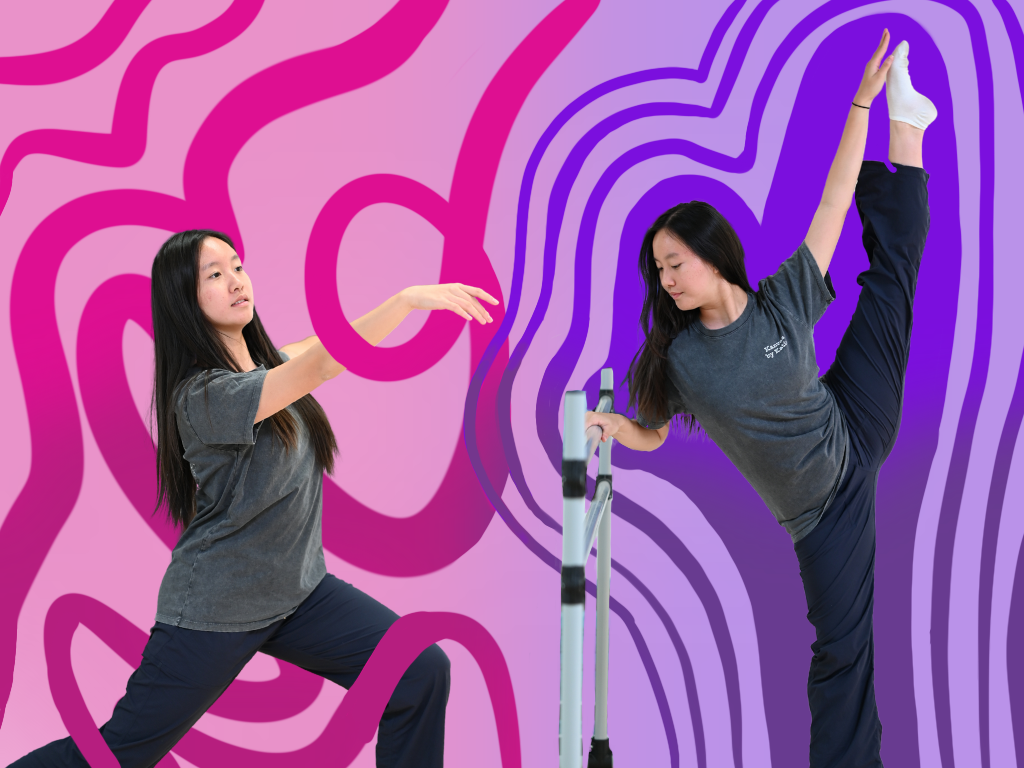Apex: Dancing at dawn on a stage of ice
Provided by Alice Feng
Alice Feng (11) performs her skate routine with a flowing red fan as a prop. Her bejeweled dress recalls elements of Chinese culture, an inspiration to the routine.
October 31, 2020
If there’s one thing Alice Feng (11) has learned after nearly ten years of figure skating, it’s how to wake up early in the morning.
Driving into the Solar4America Ice parking lot at 5:20 a.m. on Labor Day, she’s up and moving before the sun has even risen, jumping straight into her stretches as she waits for the skating rink to open. For 25 minutes, she warms up around her car, loosening her muscles with both static and dynamic exercises. At 5:45 a.m., Alice and the other skaters file into the lobby — while maintaining social distancing protocols — and head to the ice arena, each athlete beginning their training by skating large laps around the rink. For the next few hours, they practice skills and tricks over and over again, either working independently or under the guidance of a coach.
From an outsider’s perspective, this space is a flurry of motion, filled with the sounds of blades scraping the ice and skaters zooming past, jumping and spinning almost effortlessly. For the athletes themselves, these sensations are magnified to the extreme: Alice compares the feeling of wind blowing against her face and her stomach dropping during each jump to riding a roller coaster. She craves the rush and the speed, which come so naturally.
“When you skate long enough, the skates become a part of your body,” she said. “And it’s really exciting when you get into a spin in the right position, and it just keeps on going. You don’t even have to try that hard for it to get really fast.”
Alice first joined the world of figure skating when she was six years old, after a trip to an ice rink in Sacramento with friends piqued her interest in the sport. She signed up for a lesson soon after and has been training regularly ever since. Now as a senior lady skater, she’s part of the most advanced group in her category and competes with Olympic-level athletes. But her journey to get this far hasn’t been easy.
Throughout elementary school and middle school, Alice maintained a rigorous skating schedule, juggling the demanding practices with homework and other obligations. In eighth grade, she would skate for an hour in the early morning and another hour after school every day, in addition to the six hours of off-ice practice and dance classes each week.
“Figure skating is a really, really large part of figure skaters’ lives, especially if we want to become more professional. It really takes over our schedule,” Alice said. “A lot of elite skaters, competing at the national level, or maybe even a lower level than that, want to get home schooled so that they can go to the rink more often.”
When high school started, it became more challenging for Alice to keep prioritizing her sport. In addition to the demanding schedule, skating affects other aspects of an athlete’s lifestyle, and this applies to time spent outside the actual rink too. It’s important for skaters to maintain their weight, because while they need the strength to perform the jumps, they also need to be light enough to make all the rotations before landing. For Alice, the strict diets and weight requirements brought additional pressure.
“While my coaches personally haven’t ever been incredibly strict about my diet, I’ve always felt the expectation that I have to maintain my weight, or lose weight if I go over the desired amount of pounds,” she said. “It can definitely be really stressful. These past few years, I’ve had to watch what I’m eating a lot, and it’s made it difficult to enjoy the sport as much.”
With all of these factors, Alice’s sophomore year became overwhelming, to the point where she was considering quitting the sport. In fact, for a brief period of time, skating did leave her life, when she was no longer training in March after her rink closed due to the COVID-19 pandemic.
“When quarantine first started, I was somewhat excited, to be honest, to be able to get a break from skating, just because I’ve been doing it so often for the past 10 years,” she said. “And during quarantine, when I had less exposure to figure skating, it just gradually almost left my life.”
But what seemed to mark the end of her career actually became a turning point instead. When Alice stepped back into the rink three months later, she rediscovered her love for the sport through reveling in her genuine appreciation and joy in the simple action of skating.
“It was really fun to be able to go through all the spins, and then we learned some of my jumps again. I realized how much figure skating truly means to me,” she said. “With that really big difference of not being able to skate for so long and then suddenly skating again, going back on the ice has really taught me not to take it for granted.”
Alice also turned to the skating community — her coaches and the other athletes — for help when dealing with these setbacks, finding a “supportive” and “encouraging” environment in them.
“I really can’t imagine my life without all of the friends I’ve made from skating,” she said. “A lot of my friends have also been my competitors on the ice before. But despite that, when we’re training together, we’ll clap for each other when we see that another person has finally landed a jump. And sometimes we also try to choreograph fun programs together or give each other feedback.”
And now as the current president of her skating club’s Junior Board, Alice takes her enthusiasm for her sport to an administrative level as well. In addition to organizing volunteering activities and hosting speaker events with Olympic skaters, she has one overarching goal, influenced by her own personal experiences: to make the sport more inclusive and enjoyable for everyone, particularly for children with special needs or disabilities.
Ultimately, Alice’s journey through skating, from almost quitting to now pushing for change in her community, is a reflection of how she masters a new trick on the ice. She’s had falls and setbacks, especially over the past few months, but she’s grown from these incidents and come back even stronger. Now, whether she’s struggling with pressure, with a difficult jump or with simply having to wake up before dawn, she approaches any challenge in her path with a positive attitude and an intention to improve.
“When I first started skating and I would fall on my butt or on my knees, I would just start crying. But now I’ve gotten so used to it that it’s quite easy to recover from a fall,” Alice said. “And I tend to skate to happier songs, so even when I fall, I have to get up and continue smiling. That taught me that even if you mess up, you have to keep on going, to continue trying hard.”


















![“[Building nerf blasters] became this outlet of creativity for me that hasn't been matched by anything else. The process [of] making a build complete to your desire is such a painstakingly difficult process, but I've had to learn from [the skills needed from] soldering to proper painting. There's so many different options for everything, if you think about it, it exists. The best part is [that] if it doesn't exist, you can build it yourself," Ishaan Parate said.](https://harkeraquila.com/wp-content/uploads/2022/08/DSC_8149-900x604.jpg)




![“When I came into high school, I was ready to be a follower. But DECA was a game changer for me. It helped me overcome my fear of public speaking, and it's played such a major role in who I've become today. To be able to successfully lead a chapter of 150 students, an officer team and be one of the upperclassmen I once really admired is something I'm [really] proud of,” Anvitha Tummala ('21) said.](https://harkeraquila.com/wp-content/uploads/2021/07/Screen-Shot-2021-07-25-at-9.50.05-AM-900x594.png)







![“I think getting up in the morning and having a sense of purpose [is exciting]. I think without a certain amount of drive, life is kind of obsolete and mundane, and I think having that every single day is what makes each day unique and kind of makes life exciting,” Neymika Jain (12) said.](https://harkeraquila.com/wp-content/uploads/2017/06/Screen-Shot-2017-06-03-at-4.54.16-PM.png)








![“My slogan is ‘slow feet, don’t eat, and I’m hungry.’ You need to run fast to get where you are–you aren't going to get those championships if you aren't fast,” Angel Cervantes (12) said. “I want to do well in school on my tests and in track and win championships for my team. I live by that, [and] I can do that anywhere: in the classroom or on the field.”](https://harkeraquila.com/wp-content/uploads/2018/06/DSC5146-900x601.jpg)
![“[Volleyball has] taught me how to fall correctly, and another thing it taught is that you don’t have to be the best at something to be good at it. If you just hit the ball in a smart way, then it still scores points and you’re good at it. You could be a background player and still make a much bigger impact on the team than you would think,” Anya Gert (’20) said.](https://harkeraquila.com/wp-content/uploads/2020/06/AnnaGert_JinTuan_HoHPhotoEdited-600x900.jpeg)

![“I'm not nearly there yet, but [my confidence has] definitely been getting better since I was pretty shy and timid coming into Harker my freshman year. I know that there's a lot of people that are really confident in what they do, and I really admire them. Everyone's so driven and that has really pushed me to kind of try to find my own place in high school and be more confident,” Alyssa Huang (’20) said.](https://harkeraquila.com/wp-content/uploads/2020/06/AlyssaHuang_EmilyChen_HoHPhoto-900x749.jpeg)










